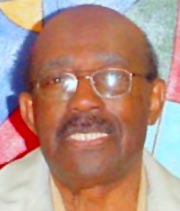Obituary
- Eric Grant
Sunrise 21st December 1913 - Sunset 3rd August 2006
"Teaching is the only profession that touches
the skills of every profession, person, race and culture,
yet Nobel prizes are rarely given to teachers per se,
but to those who have had good teachers…"-
Eric Grant.
 Eric Caesar Alexander Grant, who died at the North
Middlesex Hospital on Thursday 3rd August 2006, distinguished
himself as an educationalist and a teacher and in later
years, as a writer and poet. Eric Caesar Alexander Grant, who died at the North
Middlesex Hospital on Thursday 3rd August 2006, distinguished
himself as an educationalist and a teacher and in later
years, as a writer and poet.
Born in Bagotsville, Guyana, on 21st December 1913,
to parents who were teachers,
Eric decided from an early age that he wanted to
follow in their footsteps. Buoyed by his parents’ influence
and his own aptitude, Eric, aged eleven, won a partial
scholarship to attend the Collegiate High School
in Georgetown. He wrote his School Leaving Examination
in 1928. Armed with this qualification, he started
his teaching career at Rattray Memorial Congregational
School at age fourteen.
This he had to put on hold however since there was
no salary for the job. He decided to become a chemist
and successfully completed his preliminary exams whilst
working in a pharmacy. After a number of years in pursuit
of this ambition he realised that his true vocation
was not in a chemist shop, and left to study for his
Cambridge Examinations with the intention of going
back into teaching. His first appointment after gaining
his Junior and Senior Cambridge Certificates was a
job at the St. Matthews High School.
He impressed so much there, that after a year in that post the Principal sent
him to be the Headmaster of its branch school, Martin’s AME Zion School.
By 1937, Eric had gained a reputation as an innovative
educator and was offered the post of Headmaster at
La Harmonie Congregational School in the Upper Demerara
Region. Eric and the school excelled. During his tenure
he raised standards to levels where pupils were able
to pass the Primary School Leaving Certificate as well
as the Eleven Plus scholarship examinations. Eric also
widened the curriculum to include basket-weaving, a
skill which pupils used to good effect to raise money
to buy themselves books and stationery. His visionary
approach did not go unnoticed. In 1944, after qualifying
for his Third and Second Class Teachers’ Certificates,
he was invited to become Headmaster of Ituni Undenominational
School in the bauxite area of Guyana. Under his robust
leadership, he harnessed resources and staff which
enabled the school to achieve unprecedented results
and win national acclaim.
Eric first came to the UK in 1957 to study for a Diploma
in Rural Education at the University of Reading. Over
the 2 years of the course, he was required to do teaching
practice, and he had his first exposure to teaching
in the UK which he enjoyed, despite the challenge of
being the only black teacher in a white school in Berkshire
at that time.
Upon completion of his studies, he went back to Guyana
where he held two more Headmasterships before returning
to Reading University to study for the Postgraduate
Professional Teachers’ Certificate, which he
successfully gained in 1965. On his subsequent return
to Guyana, he held a position of Lecturer at the Environmental
Teachers’ Training College. Then, in 1967, he
was appointed the Superintendent of the In-Service
Teachers’ Training College - a position in which
he remained until his retirement in 1973.
His retirement had to be curtailed, however, as he
was encouraged to become the Principal of Linden Evening
Institute in that same year and, after three years
in this post, he was appointed Curriculum Development
Officer for Social Studies, Ministry of Education in
1976.
Eric finally retired in 1982 and came to the UK to
join Lily, his late first wife, herself an outstanding
teacher, both in Guyana and in London. Their five
children had already settled and established themselves
in the UK. Leyland, his eldest was an engineering
manager with British Telecom; the late Bernie Grant,
his second child, an activist and politician, later
distinguished himself in becoming the first Black
MP in Britain. His eldest daughter, Rosamund was
a psychotherapist and author of a number of cookery
books and his two younger daughters, Waveney and
Efua, worked in education and local government.
Eric’s passion for teaching, nevertheless, travelled
with him and he soon became involved with the Lemuel
Findlay Supplementary School in Tottenham. This position
led to his being called back into active service when
the then Chief Education Officer for Haringey suggested
that he would make an excellent supply teacher in the
Borough. Consequently, although nearing 70, he taught
in over 60 primary schools in Haringey for the next
eight years. Eric finally put down his tutorial books
in the late 1980s, but remained a trustee of Lemuel
Findlay.
In his retirement Eric enjoyed travelling and visited
many parts of world, including West Africa, North America,
Europe and the Caribbean. He was also a prolific writer,
in both prose and verse, and has left a large selection
of essays about his life experiences. After the death
of his son Bernie, he embarked on writing a book, which
he entitled ‘Dawn to Dusk’, chronicling
his son’s life. The book was completed shortly
before his passing.
Eric has left an indelible impression on the education
system in parts of Guyana. He was Headmaster of six
state primary schools, Principal of a state secondary
school and, in between these appointments, he established
two private secondary schools. His personal motto was: ‘Learn,
teach and serve your community’.
Eric is survived by his second wife, Constance, his
children and their families.
�
|




